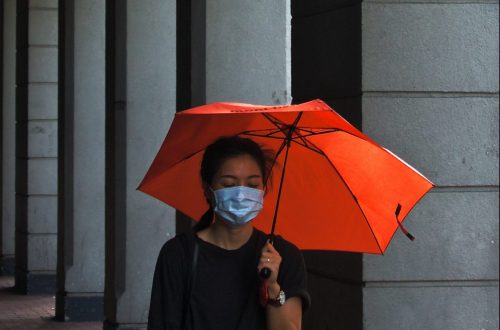A survey of the research shows that the science of mask wearing is hardly “settled.” And this up-in-the-air nature of it all is a reminder of how immoral it is to impose mandates on people, backed with state violence.
Written by Chris Calton
Republished with permission from Mises.org.
As the “fifteen days to slow the spread” continues to extend indefinitely, the issue of mask mandates has become increasingly contentious. The debate has been exacerbated by the inconsistency of the recommendations of authorities (political, scientific, and imaginary). Early in the pandemic, both the Centers for Disease Control and Prevention (CDC) and the World Health Organization (WHO) advised against the use of masks, except by those who are particularly vulnerable (the elderly and immunocompromised) and their caretakers.
Many of us with some understanding of economics made such arguments at the outset of the debate, not necessarily because of any epidemiological expertise. When you understand the principle of scarcity, policies mandating that healthy teenagers vie for medical products with their more vulnerable grandparents is a formula for exacerbating the most severe outcome of any viral infection. In fairness, many medical experts raised exactly these concerns, even if they did not enjoy the media attention of their more demagogic counterparts.
Regardless of whether or not you agree with the masks-for-all policy, it is heartening to see how well entrepreneurs adapted to the spiked demand, making masks cheaply available in various designs, sizes, and materials, solving the problem of fear-driven people trying to steal masks from emergency rooms. Of course, the dazzling speed of the market response obscures the fact that the adaptation to new conditions and an ostensible emergency would have been even more immediate had private businesses not been forced to wait on Food and Drug Administration (FDA) approval to sell masks to healthcare workers.
Of course, profit-motivated entrepreneurs in market societies seek to fulfill demand irrespective of whether said demand is based on rational science, delusional belief, or anything in between. The refrain I’ve heard many times is that “the science has proven” the effectiveness of masks. Of course, the claim that science has “proven” anything is a red flag for what F.A. Hayek called “Scientism”—the “slavish imitation of the method and language of Science.”1
While scientists never “prove” any theory, conventionally understood, there is abundant literature on the efficacy of face masks, and it certainly supports skepticism of the mask mandate. A number of the leading researchers on respiratory protection and infectious disease published editorials early in the pandemic denying the efficacy of masks-for-all policies, arguing that they may lead to more harm than good (see also this editorial, though it is worth noting that some of the concern was that such policies would make people more comfortable with easing lockdown restrictions, a separate issue beyond the focus of this article). One editorial took a different approach, actually defending universal masking despite the evident ineffectiveness of the policy, arguing that “masks serve symbolic roles” in helping to “increase health care workers’ perceived sense of safety, well-being, and trust in their hospitals.” In other words, masks are beneficial as long as we believe they are, even if they’re actually pointless.
The literature on masks broadly looks at the efficacy of different types of masks and their efficacy at preventing particle penetration (controlled studies) and the likelihood of infectious spread (case studies of healthcare workers). Other studies question the detrimental effects of masks, particularly with prolonged use. Cloth masks, which have become the norm for public use, have been shown to have penetration rates as high as 97% according to a BMJ study (which used to stand for the British Medical Journal, but is now titled by its acronym). A study of the use of cloth masks during the far more serious 1918 influenza pandemic showed no beneficial results, and another study demonstrates that cloth masks are particularly ineffective compared with medical masks. Surgical and cotton medical masks fared better, but still with discouraging results overall (see here, here, here, here, and here).
As masks-for-all advocates are quick to point out, N95 respirators do show beneficial results in containing viral infections, but these are virtually unworn by the public (and they have only recently become available to those outside of the healthcare profession). However, their effectiveness appears to be dependent upon whether they are properly fitted, which suggests that even the widespread public use of N95 masks would have a marginal to nonexistent effect, as evident from another study that looked at the layperson’s ability to properly secure N95 respirators.
The potential harm of mask wearing is especially relevant, as the logic of many people is that wearing a mask can do no harm even if it is ineffective. These studies are revealing as well. A number of studies show that mask wearers actually have an increased likelihood of viral infection (an increase that corresponds to the length of use). These studies point to several potential contributing factors for these results. Several studies measured the bacteria found on masks themselves, suggesting that even if short-term masking (such as visiting an immunocompromised patient in the hospital) may be beneficial, prolonged use may compromise the usefulness of the mask (see here, here, here, here, and here). Other theories explaining why masks sometimes appear to produce increased rates of infection point to the compromised immune function caused by oxygen deprivation, which can also produce harmful effects, particularly for pregnant and asthmatic wearers (see here, here, here, here, here, and here).
The point here is not to say that masks are entirely useless in all circumstances. The literature, rather, strongly suggests that the usefulness of masks depends on a significant number of factors—type, fit, length of use, purpose, and circumstances—which are effectively impossible to account for in public universal-masking policies. The science, contrary to the ignorant platitudes we are bombarded with, has not proven that universal masking is effective in viral containment, and has instead provided substantial grounds for skepticism of such a policy.
It is also worth noting that even when looking at the literature, presentation can be misleading. One study demonstrating the efficacy of surgical masks on the public, in contradiction to similar studies, concludes that they can prevent viral spread. However, the explanation of method (a section academic readers typically skip unless they are conducting similar research) states that, “To mimic the real-life situation, under the observation by the study staff participants were asked to attach the surgical mask themselves, but instruction on how to wear the mask properly was given when the participant wore the mask incorrectly” (emphasis added).
These problems may be innocent, but research motivations are not irrelevant. While a number of studies call into question the benefits of surgical masks during procedures, a 2015 study from the Journal of the Royal Society of Medicine admitted a revealing motivation behind the research. “In light of NHS budget constraints and cost-cutting strategy,” the article explains, referencing Britain’s socialized healthcare system, “we examined the evidence base behind the use of surgical facemasks,” concluding that “there is a lack of substantial evidence to support claims that facemasks protect either patient or surgeon from infectious contamination.”
In fairness to the researchers, other studies corroborate their findings, but the fact that it took a broke socialized healthcare system to open the question is not unimportant. It not only demonstrates the relationship between motivations and research assumptions, but also reminds us of the problems of letting a central planner allocate healthcare resources in the first place (Who would have thought surgical masks would be included in debates over healthcare budgeting?).
They have also long been pointing out detrimental and counterproductive effects of mask wearing, again varying according to the particular situation, which brings up the most important question of mask mandates. Most objections are not to the masks themselves, but to the mandate, and well-documented consequences such as oxygen deprivation should give anybody pause when considering a legal requirement of wearing masks in public. We already see that most people (not just Democrats) wear masks in public regardless of mandates (some, undoubtedly, only so mask warriors leave them alone), but it is entirely irresponsible and unethical to impose such a practice on anybody.
1. F. A. von Hayek, “Scientism and the Study of Society,” Economica 9, no. 35 (August 1942): 267–91.








